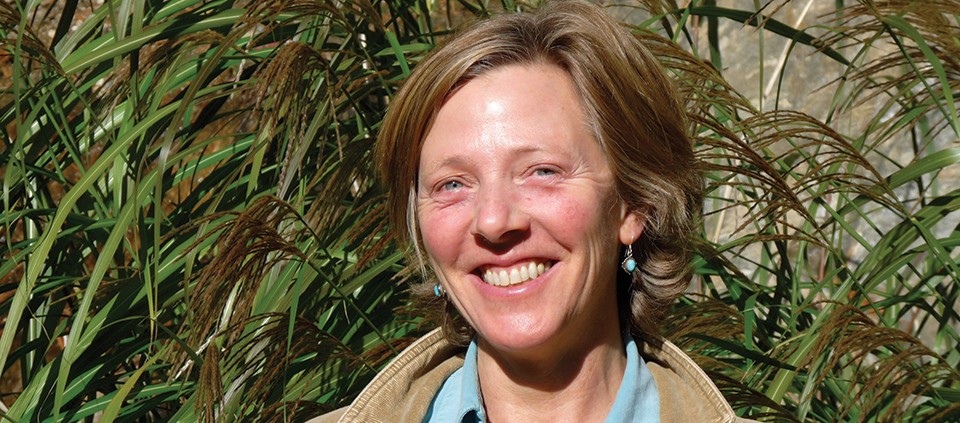Ayurveda Reaches Rural Maine: Profile of a Kripalu School of Ayurveda Graduate

When Deborah Keene was 19 years old, she set out to help her younger sister with an acne problem by making a compress of fresh-picked and steamed burdock leaves, gathered from the environs of their rural town of Liberty, Maine. While it wasn’t a cure, Deborah remembers how empowering it was to work with common, natural ingredients to try to heal her sister’s skin. “Ever since I was a child, I’ve been interested in natural health and healing,” says Deborah, who, at 54, has been teaching various forms of movement with a holistic-health focus, including yoga, for 26 years.
Deborah graduated from the Kripalu School of Ayurveda in June 2009. She still lives in Liberty, where she offers classes, workshops, and one-on-one consultations in Ayurveda at the sunlit studio on her property and through wellness centers and yoga studios in the surrounding area. Despite the dual challenges of making a living in a small town and specializing in something most people have never heard of, she says, “The word is being spread about Ayurveda and Kripalu’s program, as well as about what I do and where I do it.”
Deepak Chopra’s audiotape series Magical Mind, Magical Body and Vasant Lad’s series Ayurveda: The Science of Life introduced Deborah to Ayurveda in the late 1980s. “I realized this was my path,” she recalls. “Everything I believed in, and knew from experience, was in Ayurveda.” When Deborah—who had visited Kripalu several times over the years following her first R&R stay in the early 1990s—heard about Kripalu’s School of Ayurveda (KSA), which opened in 2005, she knew it was right for her. “I chose the KSA program because of the location and the facility, the quality of Kripalu’s programming, and the caliber and diversity of the teachers. I also chose it because of the Ayurvedic Yoga Specialist track.”
A holistic medical science that has been practiced in India for at least 5,000 years, Ayurveda is based on three fundamental energies—vata, pitta, and kapha—and their relative balance, or imbalance, in a person. “One of the things emphasized at the school is that if you understand the qualities of something—hot or cold? moist or dry? light or heavy?—that’s 90 percent of it,” Deborah says. For one assignment, students kept a journal, noting their surroundings—weather, plants, animals, etc.—as well as what they ate and how they felt, and noticing the vata, pitta, and kapha qualities in and around them. “This was such an important exercise for me,” Deborah says. “Combined with all that I learned from the incredible teachers each month, I gained a solid understanding of the fundamental principles of Ayurveda.”
When she introduces people to Ayurveda, Deborah emphasizes the practical: “It’s the simple things, the small changes over a period of time that are most important. People can be misled into thinking that Ayurveda is a lot of complicated information about what you should and shouldn’t do and eat. But that’s not it.” Diet, lifestyle, and daily routines play an important role, with the understanding that no one size fits all and that each person’s unique constitution and needs influence the choices that will lead them to vibrant health.
Deborah draws on Ayurveda to ensure that her own life is balanced and that she has the energy she needs to maintain her busy schedule. “Right now, we are in what Ayurveda considers a vata season [fall into early winter]. Vata is light, dry, cold, and moving, and our minds and bodies may be more active at this time. Out of balance, this can look like anxiety, fear, insomnia, gas, or constipation. To work well with the season, I make sure that I drink warm fluids, especially water, I eat nourishing foods—warm, moist, cooked foods and fruit, maybe lentils or homemade pumpkin pie—and I do a self-massage with sesame oil, a quick, simple way to calm the body and mind.”
Deborah began sharing what she was learning at Kripalu even before she graduated and has continued full-steam since, offering talks at women’s health conferences and natural-foods stores, working one-on-one with clients, hosting fireside chats at her home featuring the Ayurvedic dish called kitchari, and leading a four-week spring cleansing course. She regularly weaves Ayurveda into her yoga classes and has renamed her business Ayurveda Yoga Center. Her reputation is growing as she comes closer to her goal of supporting herself financially solely from her work in this field—although that is only one part of her motivation.
“I know what being in balance feels like now,” she says. “My passion is in sharing the knowledge of Ayurveda and yoga so that others will know how to care for themselves on a daily basis. I want to help remind people that we are all connected to all that exists and that the benefit of our loving care of others and ourselves will reach far and wide.”
© Kripalu Center for Yoga & Health. All rights reserved. To request permission to reprint, please e-mail editor@kripalu.org.